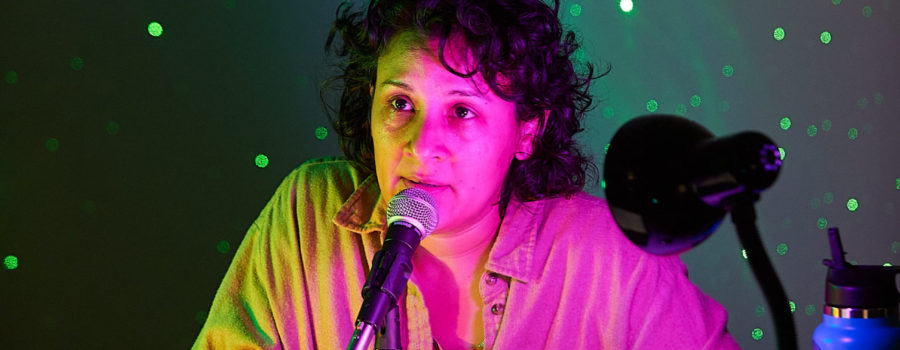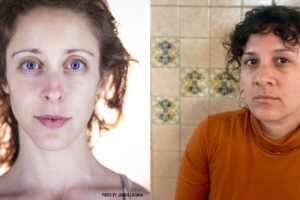June 24-June 28, 2022 // Creative Studio in the Arts District
Conversations with my Descendants via Sci-Fi Space Odyssey: a screenplay for the stage
Conversations with my Descendants via Sci-Fi Space Odyssey: a screenplay for the stage is a live multimedia performance that fuses speculative fiction, memoir, and post-colonial essay as an embodied future archive of inheritance concerned with the body/mind/spirit as technology. In the narrative, Mireya Lucio’s consciousness is reincarnated as a sentient spaceship in a distant future where humans have fled into space following the devastation of planet Earth. This narrative screenplay is the site for a conversation between Mireya-as-spaceship and their future descendant, Viajerx, the first space-born human to be sent on a return mission to an ecologically restored Earth.
In the summer of 2020, locked down and unemployed with a baby, I poured some despair into a
mixed media PDF: snapshots of book passages that grounded me, performance prompts for
channeling intergenerational colonial trauma, scenes from a fragmented sci-fi movie. I imagined
the worst possible scenario and tried to write my way back to hope. What lives after everything I
know dies? How can I look at the now from the future? Over the next two years, the document
became a screenplay and the screenplay wanted to be performed live.
This project is a departure from my previous solo projects, which focused on historical timelines
as material. Space Odyssey shifts gears from a dramaturgy of the past to a dramaturgy of the
future. By staging an impossible screenplay, I’m attempting an imaginative leap with the
audience to a possible future mired in the concerns of today but considered from a different
vantage point. This evolution of post-colonial dramaturgy in my work is directly related to
becoming a parent: imagining unimaginable futures, contending with intergenerational trauma,
raising a child in the diaspora, and the role of nostalgia in relation to the concept of homeland.
Performance vision: A sparse stage with a desk, a projection screen, a green screen, and
composer Ben Babbitt playing a live score. I read/perform the scenes in the spaceship from the
desk, accompanied by projected storyboards and atmospheric videos. These intimate and
contemplative scenes are punctuated by the live performance activations that take place in the
“Conditioning Room,” an immersive VR womb-cum-training arena where Viajerx cultivates the
feelings and emotions of their human ancestors by recreating historical/cultural moments. These
prompts, performed live in front of a green screen and composited for projection, range from
historical reenactments to nostalgic Puerto Rican pop hits. The final scene (upon their return to
Earth) is read in the dark, accompanied by an immersive sound score, inviting the audience to
enter a liminal imaginative space.

I walk into my R&D residency at LAPP with a fifty-odd page script, a few lights, and post-Covid
fatigue. As I try to stage this impossible map while playing myself as a sentient
spaceship/archive and my future cosmic-human descendant, I’m working with/towards an
embodied dramatization of the script (and Self) as archive:
The archive exists inside the narrative both as an “object” the characters interact with, and as a
cosmology that envelops them. Reflecting on Rebecca Schneider’s approach to “performing the
archive,” I’m conceptualizing the archive not as a comprehensive or architectural structure, but
as a fragmented, non-hierarchical map with multiple points of entry, meant to be activated
through the body and spirit as well as the mind. In addition to the performance prompts
activated by Viajerx, Mireya-as-Spaceship often quotes from different sources (critical theory,
mystical philosophy, cosmology, to name a few) from Mireya-the-ancestor’s (our current) time.
These archival fragments are simultaneously bridges and chasms: in this future-future of our
descendants (blood or otherwise) the fragments are seeds from our time that take root,
and what grows is both deeply familiar yet remarkably alien. These texts map a topography of ideas:
(from here/now) texts as terraforming materials/ingredients, (from there/then) Viajerx looking
back, trying to understand the evolutionary points of connection between humanity then (now)
and humanity now (then, in the future). This “dialogue by juxtaposition” creates a context of
possibilities: a landscape of descendants as fully embodied theories (and flesh and pain and
love and longing) that flourish in unprecedented ways, sometimes radically breaking with the
past, summoning an unnamed disturbance in the thread connecting them with the ancestors
(us), grappling with those past “vestiges of humanity” (us/now) in those moments when an
ancestral pattern reemerges.
I look to these fragments with hope and terror, reading them out loud, like putting seeds in my
mouth before planting them, and writing myself into watching them grow into a future-future
where these ideas are so deeply rooted that they are being categorized as native plants (even if
they were originally invasive species).
During the residency, I discovered a third space: perhaps a mound of dirt downstage from the
table, a garden within the spaceship, a place where Viajerx can inhabit their own body, their own
humanity… moving from words on the page to words on the body.
More information about our R+D Program HERE
About Mireya Lucio:
Mireya Lucio (born and raised in Puerto Rico, living in Los Angeles by way of New York) is an interdisciplinary artist, writer, director, and performer. After training as an actor (BFA Tisch/NYU; Moscow Art Theatre; MFA CalArts), Mireya developed a performance-making practice stemming from a love of dramaturgy and intuitive assembling. Mireya’s work has taken the form of dinners, lectures, walking tours, videos, stage shows, and game nights. Her full-length solo performances unravel timelines embedded with precise historical reenactment into musical extravaganzas: “Brandenburg Gate: The American Hits” (an episodic timeline of US presidential visits and foreign celebrity presence in Berlin, along with renditions of number-one Billboard Chart hits of the day), and “¡Con la boca es un mamey!” (a non-authoritative lecture-cum-personal revisionist history of Puerto Rico as a U.S. colony). Her collaborative practice with Sallie Merkel, Emotional Labor Co., weaves popular culture and academic inquiry into non-linear, transgressive studies of girlhood (as in “Our-So-Called Sleepover, or, Freud and Jung Crash 1995 Through a Ouija Board”), and creates transformative ritual via playful entertainment (as in “The Commons” digital series and the iterative “Witches’ Cabaret”).









![Los Angeles Performance Practice presents the 10th edition of the Live Arts Exchange [LAX] Festival](https://performancepractice.la/wp-content/uploads/2023/08/Festival-Pass-300x200.png)